Botvinnik’s Best Games of Chess II: Review
In his last review chessbibliophile dealt with the first volume of this series that traced the rise of Mikhail Botvinnik through 1920s and 30s.
In this review he deals with the second volume that describes Botvinnik’s ascent of the chess Olympus and his struggle to remain on top thereafter. We have also added links to some rare historic footage on World Championship 1948.-Ed.
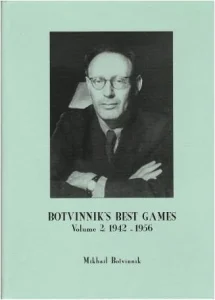
Botvinnik’s Best Games
Volume 2: 1942-1956
by Mikhail Botvinnik
Translated by Dr. Ken Neat
Hardcover, 496 pages
Moravian Chess. 2000
31st May 1944, Moscow. The House of Trade Unions Hall is packed to capacity. There are milling crowds outside anxiously watching demonstration boards. The tournament bulletin is selling out like hot cakes. Moves are being broadcast over the radio and press reports are rife with speculation as to who would win the 13th USSR Championship. And not without reason. The young talent Vassily Smyslov has a flying start with 6.5 points out of 7 rounds. Surprisingly, the reigning national champion Botvinnik has found the going difficult. He only managed a draw in the first round and then took three evenings to beat his next opponent, Ravinsky in 126 moves. Evidently the winner of Moscow and Nottingham International Tournaments is still struggling with his form. And here comes this critical round that would decide the fate of the championship.
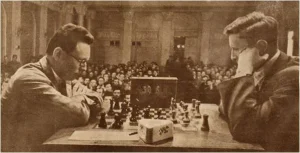
Vassily Smyslov – Mikhail Botvinnik
13th USSR Championship
31st May 1944
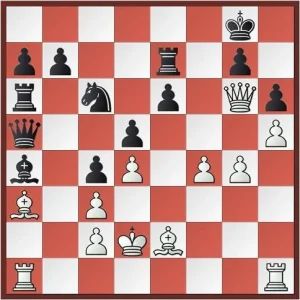
Black to move
A dramatic encounter! But then there are quite a few such encounters in the book. Among them I would single out his game with Romanovsky (1945). Botvinnik nurtured his fighting spirit through these battles in the USSR Championships.
The period also saw the rise of his rivals, Bronstein and Smyslov. Unfortunately, the challenge of Bronstein faded after the 1951 World Championship Match (12:12).Smyslov, however remained unswerving in his efforts and the contest between the two dominated the chess scene for decades. From the Western world the only player who represented a serious threat to Botvinnik was Reshevsky. Sadly, his lack of preparation and time trouble affected his play in the World Championship 1948.
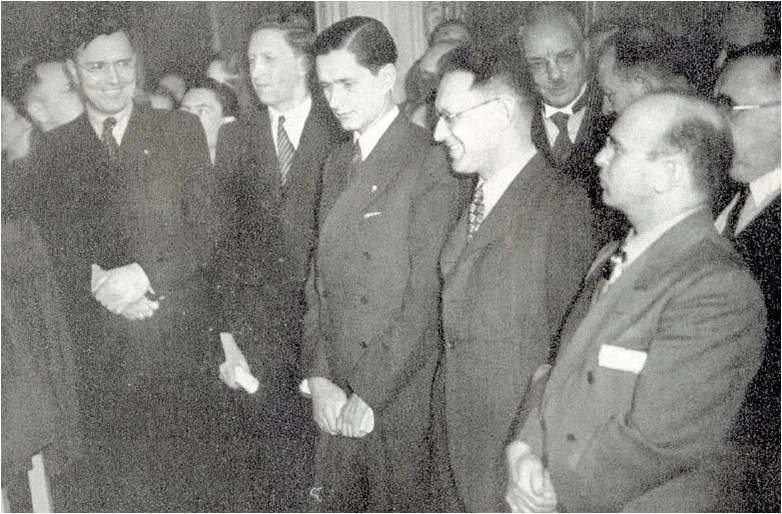
(Participants from L.to R.:Dr.Max Euwe, Vassily Smyslov, Paul Keres, Mikhail Botvinnik and Samuel Reshevsky)
Chess players arrive in Holland 1948 (video)
Chess Championship 1948 (video)
Here is a critical moment from their game in the 4th Cycle
Samuel Reshevsky – Mikhail Botvinnik
World Championship, 3rdMay 1948
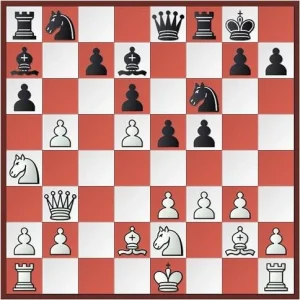
Black to move
There was no love lost between Botvinnik and Bronstein. Bronstein never “forgave” Botvinnik for drawing the Match and retaining the title and Botvinnik did not forgive him for having come so close to wrest the title that was so precious to him. The shadow war continued till the end through press interviews and their own writings. From my experience I can only say, it’s very interesting to read the rival descriptions of each other and their games. In this book Botvinnik gives as many as 9 games from their World Championship Match. For all his objectivity it is still a one-sided account. Here is a famous encounter and I have also added Bronstein’s version of what really happened. Before this game the match situation was quite favorable for Botvinnik. After a series of fighting draws he had lost the 5th game. Then he had asserted himself and won the 5th and 7th. Worse, he had put his opponent under enormous pressure in the 8th. Now he was determined to put this “upstart” in his place. But the young challenger, with wounded pride was as willing to fight. So the battle was joined.
Mikhail Botvinnik – David Bronstein
World Championship Match (9)
3rdApril 1951
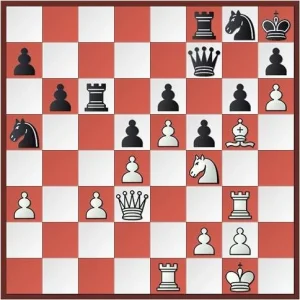
White to move
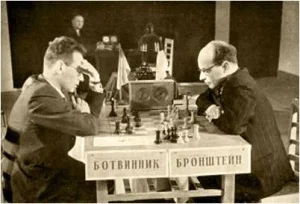
(Botvinnik podering over his move in the last game of the Match. It ended in a draw)
In fairness to Botvinnik he is less biased in his treatment of the 1954 World Championship Match with Smyslov (12:12 again!). If one looks at these games the year 1948 serves as a kind of benchmark. Before that year Botvinnik sought and reveled in difficult positions. He courted danger, fearing no one. But after 1948 his play changed. His work on doctoral thesis and professional career as engineer left him little time for preparation. Increasingly, his style became sober and he relied more and more on technique. Both Bronstein and Smyslov in their different ways compelled him to return to his old form.
This brings me to the contents of the book. In the introduction Botvinnik offers a personal narrative of events and it is followed by 143 deeply annotated games. Of them 130 are regular tournament & match games and thirteen training games. There are also eighteen pages of black-and-white photos, sixteen pages of cross-tables, and an index of openings.
Last but not least, Dr. Ken Neat, translator has provided brief notes, correcting errors in Botvinnik’s analysis with the help of a computer. More needs to be done. In the next review I shall deal with the last volume of this trilogy.
Get the book: Botvinnik’s Best Games Volume 2: 1942-1956
Notes:
1. In the end Botvinnik claimed the title in the 13thUSSR Championship with 12½/16 and Smyslov came second with 10½/16.
2. Both Botvinnik and Bronstein wrote their own accounts of the match:
Match for the World Chess Championship Mikhail Botvinnik-David Bronstein Moscow 1951by Mikhail Botvinnik(Edition Olms.2004)
This book also has entries during the Match from Botvinnik’s personal diary.
David Bronstein: Chess Improviserby B.S. Vainstein (Pergamon Press.1983)
The last part of this book has Bronstein’s own narrative of the Match will annotations to all games.
Credits:
1. The image of the book is taken from Chess Café shop.
Thanks, Mr.Mark Donlan.
Much appreciated.
2. The image of Smyslov-Botvinnik 1944 is taken from ChessPro.ru
Thanks, Art!
3. Other images are taken from the public domain.



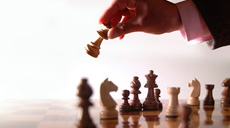
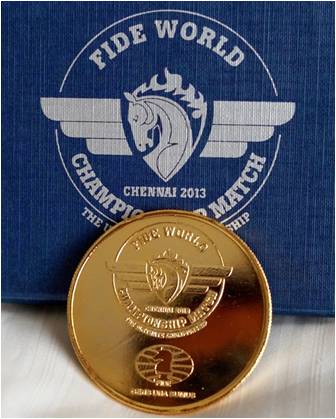





Comments: